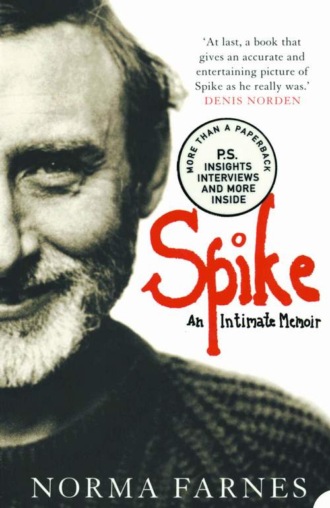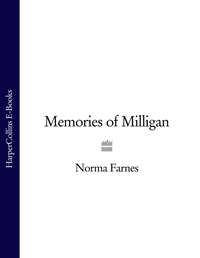
Полная версия
Spike: An Intimate Memoir
The sheer pressure of the day made me burst into tears when I got home. My dear mother was mortified. I can still hear her now. ‘Dear oh dear. For goodness’ sake don’t go back there any more. All this upset. It’s only a job. I’ll have a word with Dick Colclough at the Town Hall. He’ll get you a respectable job in his department. There’ll be none of this upset there.’
The tears dried up immediately. ‘What do you mean – a job at the Town Hall? I couldn’t stand it. Boring, boring, boring! If you think I’m going to let Jack Clarke browbeat me you’re wrong. When I go in tomorrow I’ll give him a piece of my mind.’
Mum could not understand my reasoning then and to the end of her days wished I had gone to the Town Hall or stayed at ICI, married a local boy, settled down and provided her with grandchildren. But I was not interested. The same determination not to give in to Jack’s forceful personality would serve me well as I refused to wilt when times were bad with Spike.
When I arrived at the office the next morning Jack behaved as if nothing had happened. That was yesterday’s news and therefore history as far as he was concerned.
Jack and I had a vibrant, loving relationship for almost three years. He would leave his family: this week, next week, after Christmas, sometime, never. Eventually I realized I took second place to them, though I knew he adored me. It had been the most wonderful and exciting time of my life and he would always be in my heart, but the time had come to part. I was desperately sad and I think I decided then that this journalism lark was not for me. Jack had opened the door into the world of television and I was fascinated by it.
Back in the office I looked at Kenneth Kendall. ‘It’s time to move on again,’ I told him. I was ambitious and determined to find a production job in television. There was only one place for that – London. I made a vow. I would never have another affair with a colleague or a married man. I had learned my lesson. I never did.
Pat Howden, my friend from hitch-hiking days, had gone to work in London a year or so earlier. She had asked me to join her but I did not want to leave Jack. ‘Idiot!’ she said. ‘There’s no future in that.’
Since then I had spent the odd weekend in London, staying in the flat she shared with four other girls. I got on well with all of them, particularly Diana Holloway, a lovely Welsh girl. When Pat moved to Paris to join her future husband I telephoned Diana to see if I could bum a bed for three or four weeks until I found a flat. ‘You can have the spare room and it’ll help us with the rent,’ said the ever practical Diana. So off I set for my new home, a flat with two double bedrooms, both with two single beds, and a box room – the one I was to use – in a Victorian house on the Fulham Road.
I have no trouble remembering the date I moved in because as I walked through the front door a television newsreader announced, ‘Marilyn Monroe has been found dead.’ 4 August 1962. Marilyn was, and still is, someone I idolize. Instead of an evening of celebration for the start of a new period in my life it was one of mourning. ‘Welcome to London and all its glitter,’ I thought glumly.
I unpacked my case in the box room, squeezed six outfits into the built-in wardrobe, turned a small table under the window into a dressing table, shoved my suitcase under the bed, and Norma Fames of 32 Langley Avenue, Thornaby sank onto it to mourn Norma Jean of Tinsel Town. What a depressing start to my new life.
The next morning my eyes opened to sunshine. No time to waste. Up bright and early to find some temp work to pay for my share of the expenses.
Household duties were on a roster basis. The one who did the shopping also did the cooking, and it soon emerged that only Diana and I were prepared to splurge on extravagances to relieve the interminable diet of chops and mince. Diana worked in the Burlington Arcade and told me there was an employment agency round the corner, Nu Type. I put on my glad rags and was interviewed by a Mrs Long, who tested my shorthand and typing speeds. Satisfied, she eyed me. ‘You’re very well groomed, very smart. You’ll be easy to place.’ She made me feel like the final piece of a jigsaw. I said I needed temporary work until I found something permanent.
‘No trouble,’ she said. ‘Felicity Green – she’s Woman’s page editor on the Daily Mirror – wants someone for a week.’
I was familiar with newspaper work, loved the job, worked hard and Felicity gave a glowing report. Mrs Long was delighted. ‘You’ll be a wonderful advertisement for the agency,’ she said. I did not give a damn as long as I got the plum jobs.
My second assignment was with Granada Television in Golden Square, another familiar medium; the third with a peer in sumptuous offices in Half Moon Street, which was easy-peasy, just answering the phone, typing a few letters, plus walks in Green Park. Within weeks I was earning more than I had dreamed possible, and happy to work evenings and weekends.
Two weeks after I arrived in London, when we were relaxing in the flat on a Saturday morning, the front bell rang. It was my father. Mum had sent him to make certain I had not been debauched by the big city, that I was not living in a hovel or suspect neighbourhood, that my flat-mates would have met with her approval and that my employers were not gangsters or whiteslave traders. His anxious face soon relaxed into a smile. Then I noticed a large carrier bag. Food for the needy: lamb chops, pork chops complete with succulent kidneys, fillet steaks, sirloin steaks and pork sausages, just to make sure I did not die from malnutrition. These visits went on for five months until I told him it would have to stop. Instead I agreed to travel home once a month, which I did for many years. He was always there, waiting for me on the platform at Thornaby station.
After a year or so I started wondering whether I should get a ‘proper job’, that is, a permanent one. I still wanted to become a television producer so was happy when Mrs Long found me a job as assistant to the information officer at the Independent Television Companies’ Association (ITCA), Television House, not far from Covent Garden. But as I found out the ITCA’s rôle was mostly administrative, serving as the industry’s watchdog.
My boss liked to use his wartime title of major. On my first day he went to lunch at 12.30 p.m. precisely. At five o’clock he telephoned. ‘Are you coping, my dear? Good. I knew you would be. No point in coming back to the office now.’ A cough. ‘I’m afraid I fell among thieves.’ As he did most days. Although he was almost a caricature of the retired Army officer he was very kind and I liked him. However, after a couple of years covering up for him he was abruptly fired and I took over his responsibilities.
Every month since I started there had been obituary meetings to update the planned coverage for the funeral of Sir Winston Churchill, and like him they went on for ever. Three days after we had said goodbye to the major Sir Winston died and I was thrown in at the deep end, having to liaise with each television station to let them know what their rôle would be. Up to that time the longest outside broadcast had been two hours but this would last five. We all worked night and day but it was worth it when newspapers acclaimed our coverage, which they reckoned was superior to the BBC’s.
I saw the cortège as it passed our offices and remember wondering how such a small coffin could contain this giant of a man. All those who worked on the funeral were given a specially printed brochure, The Valiant Man, which is still one of my treasured possessions.
Then I was offered the major’s post. All very well, I said, but what was in it for me? I could have a secretary and my name on the door. How about increasing my salary? Two pounds a week was the offer, far less than they had paid the major. It was decision time. I could not even consult Kenneth because he had been lost in the various moves. But I did not need to. This had been a man’s job and I wanted a man’s rate of pay for it. Oh dear no! That would never do. Equal pay simply was not on as far as they were concerned. But it was for me. So after two years it was time for a change. The ITCA was too much like the Civil Service for my liking. I would seek temporary work until I could find a job in television production. Something to tide me over for a few months would be ideal.
Конец ознакомительного фрагмента.
Текст предоставлен ООО «ЛитРес».
Прочитайте эту книгу целиком, купив полную легальную версию на ЛитРес.
Безопасно оплатить книгу можно банковской картой Visa, MasterCard, Maestro, со счета мобильного телефона, с платежного терминала, в салоне МТС или Связной, через PayPal, WebMoney, Яндекс.Деньги, QIWI Кошелек, бонусными картами или другим удобным Вам способом.



